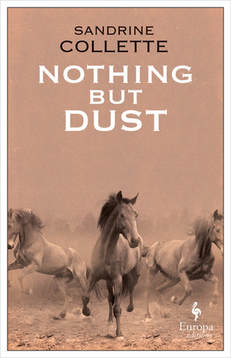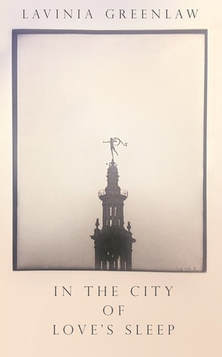Nothing but Dust by Sandrine Collette
translated by Alison Anderson
Kindness doesn’t seem part of this woman’s repertoire as, each morning, she directs her sons to their chores. To her, motherhood is not about sacrifice or, at least, not hers. Even though they run the farm between them, the boys receive no pocket money or pay. As far as she’s concerned, having housed and fed them puts them for ever in her debt.
Rarely receiving visitors, the boys know no different; his brothers were withdrawn from school soon after their father disappeared, and Rafael’s never been. Their mother has taught them the basics but, while skilled beyond their years in the practicalities of estate management, their capacity for conceptualising alternatives is severely curtailed. Even when the older boys reach their teens and have the physical strength to oppose her, they have too much respect for her position to rebel, and the third son has made himself mute, tolerating being perceived as a halfwit, to avoid disclosing what he’s seen.
While the situation’s bleak, the writing certainly isn’t, the reader can invest in the characters, particularly the scapegoat Rafael. And the tenderness they can’t share with each other, finds expression in their relationships with the animals, particularly their horses and dogs.
When the mother gambles one of the boys in a poker game, it seems that things can’t get any worse. But it could be that leaving the homestead is exactly what he needs. Although it might be too sentimental to expect an altogether happy ending, this is nevertheless an uplifting story of endurance and survival against the odds.
First published in French in 2016, Alison Anderson’s translation is published by Europa editions who provided my review copy. My only criticism is that, while there were indications that this was set some time in the last century, it wasn’t immediately obvious exactly when. But that doesn’t stop me from adding it as a third translation – and a first from a female author – to my books of the year.
In the City of Love’s Sleep by Lavinia Greenlaw
Iris is in the process of separating from her husband, who suffers from MS, when a stroke leaves him disabled in mind and body, and barely recognisable to their two girls. Raif, still grieving from the death of his wife two years earlier, has recently invited a woman, his girlfriend in all but name, to move in. The couple draw closer, move back, dancing around their not inconsiderable baggage in a way they struggle to understand.
Like Iris and Raif, I found myself alternating between being drawn into and retreating from the text. I relished the author’s refusal to oversimplify the process of two wounded people coming together (rather like Diana and Simon in my debut novel, Sugar and Snails) until I lost patience with their overthinking, before once more being drawn back in.
Publishers Faber and Faber, who provided my review copy, describe poet Lavinia Greenlaw’s third novel as “a contemporary fable about what it means to fall in love in middle age”, but we bring our attachment history to the relationship at any age. And perhaps it’s the kind of novel that needs another relationship to analyse fully; one for book groups, I think.
| “Cracks”, one of the flash fiction pieces in my anthology, on the theme of identity, Becoming Someone, presents another perspective on lost love, and you can watch me reading it here. | |























 RSS Feed
RSS Feed





















